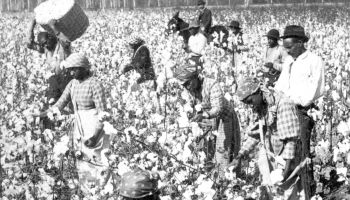Black trauma in America began with slavery and continues to this very day with the tidal wave of police killings and senseless 911 phone calls to cops. As the country pauses to recognize National PTSD Awareness Day on Wednesday, it’s important to remember that Post Traumatic Stress Disorder is not just a condition that only affects military veterans.
See Also: Black Trauma: Dissecting The Impact Videotaped Killings Have On Our Psyche
Slavery and everything associated with that inhuman institution — from the torture and rape of Black bodies to the cruel separation of families — has cast a long shadow of mental anguish, Dr. Kevin Washington, the former president of the Association of Black Psychologists, told NewsOne Now in 2016.
“We can have post-traumatic stress disorder – post-slavery,” he explained. Though African-Americans are no longer in bondage, it does not necessarily mean “we’re beyond the trauma” of enslavement. That trauma, according to studies, can be generational, he added.
The trauma continued long after slavery ended through terrorism from violent white supremacist groups, like the Ku Klux Klan. Black people lived in constant fear of getting lynched at the whim of white people–without having any access to justice.
During the Civil Rights Movement, peaceful demands for equality were met with an iron fist. Water cannons were among the tools used to inflict pain and terror on Black folks who white people felt had the audacity to demand to be treated like human beings. In fact, the threat of turning on the water cannons on nonviolent Black protesters continues today.
More than a century and a half since slavery ended, law enforcement officers have been inflicting a fresh round of trauma on Black people through the troubling trend of police killings of unarmed Black men.
These repeated high-profile cases, from Michael Brown in August 2014 to Antwon Rose on June 19, damage the mental health of African-Americans, a study published June 21 in The Lancet, a British medical journal, confirmed. It’s a finding that Black folks have long known.
Meanwhile, racial profiling, which may seem harmless to some, inflicts even more psychological pain on its victims, who many times are Black. It seems almost weekly that a white person calls the cops to arrest an African-American who’s doing something that they wouldn’t question seeing another white person doing—like barbecuing in a public park.
The most recent series of racial profiling cases got started with the infamous incident at a Philadelphia Starbucks in April. Two Black men were waiting for a business associate to arrive when a manager called officers because they were doing what scores of people did every day at Starbucks—use the coffee shop as a meeting place before making a purchase.
https://twitter.com/PsychologyDoc/status/985275763602714628
SEE ALSO:
Here’s How Much Money Lee Daniels Is Worth As Damon Dash Demands To Be Paid Back $2 Million
Here Are The Spineless Democrats Who Turned On Maxine Waters
An Unofficial Timeline Of All The Ways Black Folks Have Experienced Post Traumatic Stress Disorder was originally published on newsone.com









